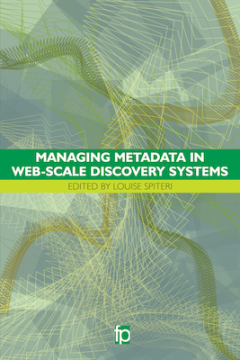
Additional Information
Book Details
Abstract
This book shows you how to harness the power of linked data and web-scale discovery systems to manage and link widely varied content across your library collection.
Libraries are increasingly using web-scale discovery systems to help clients find a wide assortment of library materials, including books, journal articles, special collections, archival collections, videos, music and open access collections. Depending on the library material catalogued, the discovery system might need to negotiate different metadata standards, such as AACR, RDA, RAD, FOAF, VRA Core, METS, MODS, RDF and more.
In Managing Metadata in Web-Scale Discovery Systems, editor Louise Spiteri and a range of international experts show you how to:
• maximize the effectiveness of web-scale discovery systems
• provide a smooth and seamless discovery experience to your users
• help users conduct searches that yield relevant results
• manage the sheer volume of items to which you can provide access, so your users can actually find what they need
• maintain shared records that reflect the needs, languages, and identities of culturally and ethnically varied communities
• manage metadata both within, across, and outside, library discovery tools by converting your library metadata to linked open data that all systems can access
• manage user generated metadata from external services such as Goodreads and LibraryThing
• mine user generated metadata to better serve your users in areas such as collection development or readers’ advisory.
The book will be essential reading for cataloguers, technical services and systems librarians and library and information science students studying modules on metadata, cataloguing, systems design, data management, and digital libraries. The book will also be of interest to those managing metadata in archives, museums and other cultural heritage institutions.
This book shows you how to harness the power of linked data and web-scale discovery systems to manage and link widely varied content across your library collection.
Libraries are increasingly using web-scale discovery systems to help clients find a wide assortment of library materials, including books, journal articles, special collections, archival collections, videos, music and open access collections. Depending on the library material catalogued, the discovery system might need to negotiate different metadata standards, such as AACR, RDA, RAD, FOAF, VRA Core, METS, MODS, RDF and more.
In Managing Metadata in Web-Scale Discovery Systems, editor Louise Spiteri and a range of international experts show you how to:
- maximize the effectiveness of web-scale discovery systems
- provide a smooth and seamless discovery experience to your users
- help users conduct searches that yield relevant results
- manage the sheer volume of items to which you can provide access, so your users can actually find what they need
- maintain shared records that reflect the needs, languages, and identities of culturally and ethnically varied communities
- manage metadata both within, across, and outside, library discovery tools by converting your library metadata to linked open data that all systems can access
- manage user generated metadata from external services such as Goodreads and LibraryThing
- mine user generated metadata to better serve your users in areas such as collection development or readers’ advisory.
The book has a nice balance of the practical, describing challenges of managing metadata in web-scale discovery systems, and the theoretical, encouraging libraries to explore those “what if” moments in discovery systems...As user experience and the search process becomes more and more relevant, the topics in Managing Metadata in Web-scale Discovery Systems become critical to librarians who manage large volumes of data in discovery systems.
Brianne Hagen
Humboldt State University
Library Resources & Technical Services
...the strength of this work lies in providing a foundation for the concepts, trends, and challenges of managing metadata in web-scale discovery systems.
Elizabeth Hertenstein
Cataloger & Metadata Librarian, Bowling Green State University
Cataloging & Classification Quarterly
I recommend Managing Metadata to catalogers and metadata specialists, systems librarians, and other staff who are moving to or are new possessors of web-scale discovery systems. When taken together with a deeper exploration of the resources named in the bibliographies, I feel this text also may offer food for thought to those librarians already well-ensconced in these systems.
Technicalities
It was interesting to learn about the leading projects, primarily from national libraries, and see some real examples of linked open data sets. Big data, the Semantic Web and BIBFRAME are also covered but nothing gets too complicated, making it a great introduction to this area.
Catherine Smith
Catalogue and Index
Managing Metadata contains a wealth of valuable information and tools for librarians on web-scale discovery systems and metadata. Touching on the varied forms of metadata creation, it explores how these new web-scale discovery systems will impacy the way libraries provide access to resources in the future. It is recommended reading for librarians in all types of library environments.
Margaret M. Kain
University of Alabama at Birmingham Libraries
Against the Grain
Stuart’s writing style is clear and straightforward, and his occasional subtle humor helps to make a potentially dry topic less tedious. Practical Ontologies for Information Professionals is strongly recommended for all librarians who work with linked data or are thinking about it, and would be useful to have on hand as a resource in metadata departments.
Christine DeZelar-Tiedman
Metadata and Emerging Technologies Librarian, University of Minnesota Libraries
Cataloging & Classification Quarterly
Dr. Louise Spiteri is Director of the School of Information Management, Dalhousie University, Halifax, Nova Scotia, Canada. Dr. Spiteri has published extensively in the areas of social tagging, folksonomies, social discovery systems, and library cataloguing. Dr. Spiteri teaches in the areas of information management, metadata, records management, cataloguing, classification, and taxonomies.
